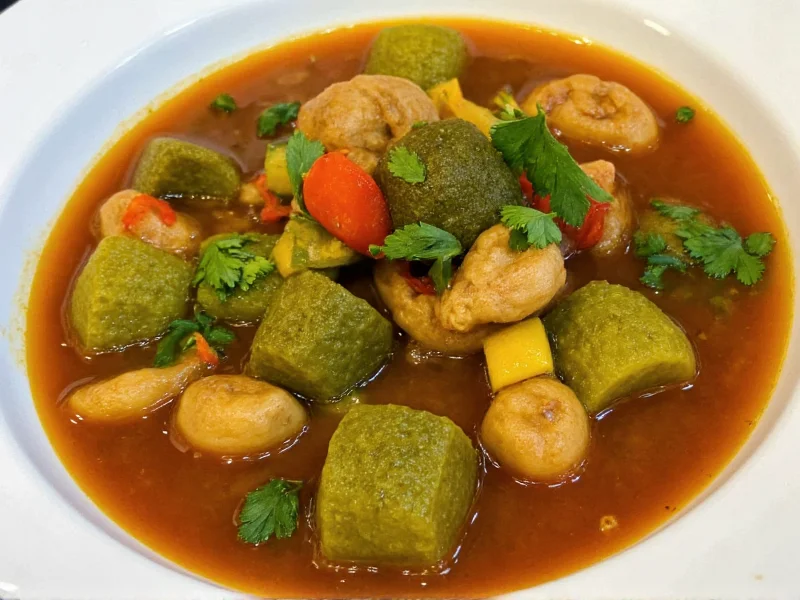Nigerian okra soup represents one of the most beloved traditional dishes across Nigeria's diverse culinary landscape. This vibrant soup varies significantly by region and ethnic group, reflecting Nigeria's rich cultural tapestry. While the Yoruba version often includes ila (locust beans) and bitterleaf, the Igbo preparation typically features ugwu (pumpkin leaves) and a distinctive blend of spices. Understanding these regional distinctions helps appreciate the soup's cultural significance beyond mere sustenance.
The Cultural Significance of Nigerian Okra Soup
In Nigerian households, okra soup transcends being just a meal—it's a cultural institution. Families gather around this dish during celebrations, ceremonies, and everyday meals. The preparation process itself is often communal, with multiple family members contributing to different aspects of cooking. In many communities, the ability to prepare authentic okra soup without excessive sliminess is considered a mark of culinary expertise passed through generations.
Essential Ingredients for Authentic Nigerian Okra Soup
The foundation of any successful Nigerian okra soup lies in its ingredients. While regional variations exist, these core components remain consistent:
| Ingredient Category | Specific Items | Preparation Notes |
|---|---|---|
| Base Ingredients | Fresh okra (4-6 cups, sliced) | Slice thinly to reduce sliminess; some prefer blending half |
| Protein Sources | Fresh fish, smoked fish, beef, goat meat, or chicken | Pre-cooked and added at appropriate stages |
| Vegetables | Ugwu (pumpkin leaves) or bitterleaf | Washed thoroughly to remove bitterness |
| Seasonings | Locust beans (dawadawa/ogiri), crayfish, pepper, onions | Ground to paste for optimal flavor integration |
| Fat Base | Palm oil (1/2 cup) | Red palm oil preferred for authentic color and flavor |
Step-by-Step Preparation Guide
Creating the perfect Nigerian okra soup requires attention to technique, particularly in managing the okra's natural viscosity. Follow these steps for authentic results:
- Prepare the okra: Wash thoroughly, trim ends, and slice thinly. For reduced sliminess, blend half the okra while keeping the other half sliced.
- Prepare stock: Cook meats and fish with onions, seasoning cubes, and water to create flavorful stock.
- Build flavor base: In a separate pot, heat palm oil and sauté ground pepper, onions, and locust beans for 5 minutes.
- Combine elements: Add the prepared stock to the palm oil mixture, then incorporate the okra.
- Simmer carefully: Cook on medium heat for 15-20 minutes, stirring occasionally but not excessively to prevent over-thickening.
- Add vegetables: Stir in washed ugwu or bitterleaf during the last 5 minutes of cooking.
- Season to taste: Adjust salt and additional seasonings as needed before serving.
Mastering Texture: Avoiding Excessive Sliminess
One of the most common challenges when preparing Nigerian okra soup is managing its natural viscosity. Professional cooks employ several techniques to achieve the perfect consistency:
- Temperature control: Maintain medium heat throughout cooking—high heat increases sliminess
- Minimal stirring: Stir only when necessary, using a gentle folding motion rather than vigorous stirring
- Acid balance: A small amount of lemon juice or potash (akanwu) can help reduce viscosity
- Okra preparation: Slicing okra and allowing it to sit for 10 minutes before cooking helps release some mucilage
- Blending technique: Blend only half the okra while keeping the other half sliced for texture variation
Regional Variations Across Nigeria
Nigeria's diverse ethnic groups have developed distinctive approaches to okra soup preparation:
- Yoruba style (ògúnò): Typically includes ila (locust beans), bitterleaf, and a generous amount of palm oil. Often prepared with catfish and assorted meats.
- Igbo style (áròyèlè): Features ugwu (pumpkin leaves) as the primary green, with a distinctive blend of peppers and seasonings. Often includes stockfish and dried crayfish.
- Delta region variation: Incorporates bitterleaf and ugwu together, with a higher proportion of smoked fish and bush meat.
- Coastal adaptations: Coastal communities often feature more seafood varieties, including prawns and different fish species.
Nutritional Benefits of Nigerian Okra Soup
Beyond its delicious flavor, Nigerian okra soup offers significant nutritional advantages. Okra itself is rich in dietary fiber, vitamin C, vitamin K, and folate. The traditional preparation method preserves these nutrients while adding valuable protein from fish and meat sources. The inclusion of leafy vegetables like ugwu boosts the vitamin A and iron content substantially. Palm oil, though high in fat, provides essential vitamin E and carotenoids when used in moderation as in traditional recipes.
Serving Traditions and Accompaniments
In Nigeria, okra soup is never served alone. The traditional presentation involves pairing it with “swallow” foods that complement its texture:
- Fufu: Made from cassava, plantains, or yams, this smooth dough is ideal for scooping soup
- Eba: Garri-based swallow that provides a slightly grainy texture contrast
- Pounded yam: Considered the premium accompaniment for special occasions
- Amala: Yoruba specialty made from yam flour, offering earthy flavor notes
The proper technique involves pinching off a small portion of the swallow, creating a depression with the thumb, and using it to scoop the soup—never mixing the two components in the bowl.
Troubleshooting Common Okra Soup Problems
Even experienced cooks encounter challenges with Nigerian okra soup. Here's how to address frequent issues:
- Excessive sliminess: Add a small amount of potash (akanwu) dissolved in water, or incorporate more protein to balance texture
- Bitter taste: Ensure proper washing of bitterleaf; if using ugwu, avoid overcooking which can cause bitterness
- Weak flavor: Increase the amount of locust beans or crayfish; ensure proper toasting of palm oil mixture
- Separation of oil: Maintain consistent medium heat and avoid adding cold ingredients to hot oil
- Dull color: Use fresh red palm oil and avoid overcooking the vegetables











 浙公网安备
33010002000092号
浙公网安备
33010002000092号 浙B2-20120091-4
浙B2-20120091-4